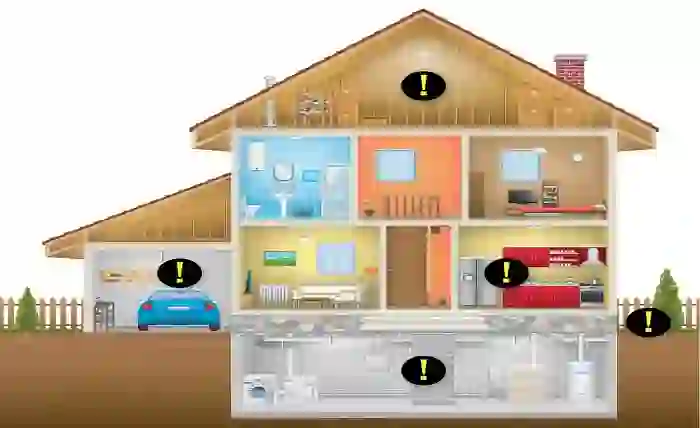Rodent-Proofing Your Home: Essential Tips and Techniques

Rodents invading your home present more than a mere annoyance; they pose significant health and structural risks. That’s why rodent-proofing isn’t a casual undertaking but a critical necessity.
In this article by pest exterminators, we will explore an array of practical, scientific methods to ensure a rodent-free environment. Still, if an infestation grows out of control, hiring professional pest control services is essential.
Eliminate food and shelter sources
The primary enticements for rodents in our homes are food and shelter. These pests are opportunistic creatures, capitalising on accessible sources of nourishment and warm, cosy spaces for refuge. When these are unavailable, your house becomes a far less appealing target.
To implement this strategy effectively:
- Maintain an immaculate kitchen: Leftover food is an open invitation for rodents. Ensure your kitchen counters are crumb-free, dishes are promptly washed, and foodstuffs, especially grains and produce, are stored in tightly sealed containers.
- Keep a well-groomed garden: Overgrown vegetation can offer safe hideouts for rodents. Regularly prune your plants, keep grass trimmed, and ensure compost bins are at a distance from your main structure.
- Remove clutter: A cluttered environment is another favourite rodent paradise, providing them with ample material for nest building. Regularly clear out areas where unnecessary items accumulate, such as garages, basements, and attics.
Locate and seal entry points
To effectively curb rodent invasion, understanding their resourcefulness and aptitude to exploit small entry points is crucial. Begin with a meticulous examination of your property, identifying any cracks, holes, or gaps in walls, floors, or ceilings which could serve as access points for these unwelcome guests. Pay particular attention to where utility lines or pipes enter your home, as these gaps can become thoroughfares for rodent traffic.
The selection of an appropriate sealant is key in your rodent-proofing strategy. Smaller gaps can be sealed with a combination of steel wool and caulk, a duo effective in deterring rodents. Larger openings may require robust materials like metal sheeting or cement. Remember, a comprehensive rodent control plan focuses on eliminating access as much as it does on removing attractants.
Make necessary repairs
Home maintenance is a significant component of your rodent pest control strategy. All pest exterminators will tell you that timely repairs not only preserve your property but also remove potential rodent entryways and hideouts. Immediately address water leaks as they create damp environments attractive to rodents like rats, which are known to swim up damaged sewer pipes.
Don’t neglect internal gaps and holes, especially since rodents can squeeze through openings as small as a quarter of an inch, facilitating their spread throughout your home.
Equally, the higher areas of your house, like vents, chimneys, and roofs are also common rodent infiltration points. By installing vent covers, repairing chimney caps, and replacing loose roof shingles, you deter their entry effectively. A vigilant eye towards your home’s structural integrity from top to bottom, inside and out, forms a formidable line of defence against these pests.
Perform regular inspections
Regular home inspections play a pivotal role in detecting early signs of a rodent problem, enabling you to take swift action before the situation grows overwhelming. Watch for clear signs of rodents, such as evidence of gnawing on objects, nests constructed from shredded materials, droppings, or distinctive rodent tracks. These signs are unmistakable indicators of a rodent incursion.
Your senses can also be powerful allies in this battle. Rodents, notably mice and rats, have a unique musky odour, which can be a warning of their presence if detected. Also, keep your ears tuned for sounds like gnawing, scratching, or scurrying within walls, ceilings, or floors, especially during quiet night hours when rodent activity typically increases. These could be the telltale sounds of a lurking rodent problem.
Store food and garbage properly
Effective management of food storage and waste disposal is essential in any rodent-proofing strategy. Rodents are enticed by the smell of food and waste, so airtight, chew-resistant containers for food, particularly for grains, seeds, and fresh produce, are crucial to minimise attraction.
Likewise, proper garbage bin management can deter rodents. Bins should have tight-fitting lids and regular emptying routines to prevent turning your waste into a rodent feast.
Lastly, prompt disposal of trash and compost is key. If left to sit, these could quickly turn your home into a rodent hotspot, particularly compost, which can provide food and nesting grounds. By maintaining these practices, your home becomes less appealing to rodents, aiding your quest for a rodent-free environment.
Sanitise and keep your house clean
Maintaining a clean and sanitised environment is key in denying rodents of sustenance, making your home less appealing to them. This involves immediate cleanup of food and drink spills, preventing these from becoming a source of nourishment for rodents. Regular sweeping and vacuuming can effectively remove fallen food particles and potential rodent attractants.
Additionally, sanitising surfaces routinely, especially in food preparation or consumption areas, minimises rodent access to food. While maintaining cleanliness demands effort, the benefits, such as a rodent-free home, make the commitment worthwhile.
Adopt a cat
Although not an infallible strategy, having a cat in your household could function as rodent pest control. Felines are inherent predators of rodents, and their mere presence might dissuade these pests from making your home their abode. However, it’s important to note that cats vary in their prey drive – some are keener hunters than others.
Additionally, it’s essential to consider the health risks involved. Rodents may carry diseases that pose potential health threats to your feline companion. Always ensure your cat is adequately vaccinated and monitored for any signs of illness if you’re considering this natural approach to pest control.
When to call pest control experts
Sometimes, despite our best efforts, the rodent issue may escalate beyond our control. In these instances, it’s time to call in pest control experts with the requisite experience, knowledge, and specialised tools to tackle the infestation efficiently and safely.
It’s advisable to seek professional pest control services when:
- You notice signs of a significant, widespread infestation. If you’re encountering droppings, nests, or signs of gnawing throughout your home, and the damage is substantial, it’s time to bring in the professionals.
- DIY solutions are not yielding results. If your attempts with traps, repellents, and home remedies aren’t cutting it, professional pest exterminators can provide a comprehensive and more effective solution.
- The infestation is recurring. If rodents seem to come back no matter what you do, it may indicate a more serious, underlying problem. Professional pest control services can pinpoint and eliminate the root cause, providing a lasting solution to your rodent problems.
Conclusion
Rodent proofing your home is a multifaceted task that requires vigilance, preventative measures, and timely action. By eliminating food and shelter sources, sealing entry points, performing regular inspections and repairs where needed, properly storing food and disposing of garbage, maintaining cleanliness, and even adopting a feline friend, you can significantly deter rodent presence.
However, when an infestation becomes too overwhelming, don’t hesitate to call in pest control experts. Through a combination of these efforts, you can secure your home and keep these pesky invaders at bay, ensuring a healthier, safer living environment.




